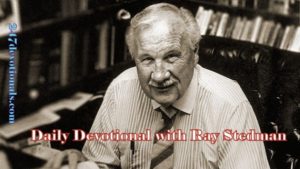Table of Contents
Topic:True Prayer
A daily devotion for June 2nd
Read the Scripture: Luke 18:9-14
But the tax collector stood at a distance. He would not even look up to heaven, but beat his breast and said, God, have mercy on me, a sinner. I tell you that this man, rather than the other, went home justified before God. (Luke 18:13-14a)

How this captures the true character of prayer. This man came into the temple and stood with his eyes cast down. He did not assume the posture of prayer. All he could do was beat his breast and say, God, have mercy on me, a sinner.
What do we learn about prayer from this man? Is it not obvious that real prayer, authentic prayer is an awareness of our helpless need? This man saw himself on the lowest possible level, a sinner. In fact, in the original language he calls himself, the sinner. The sinner, the very lowest kind, the worst kind. He believed that without God he could do absolutely nothing to help his position.
Is it not remarkable that he does not try to add anything by way of merit? He does not say, God be merciful to me a penitent sinner. He was penitent, but he does not urge that as any basis for God’s blessing. He does not say, God be merciful to me a reformed sinner. I’m going to be different from now on. He does not even say, God be merciful to me an honest sinner. Here I am, Lord, willing to tell you the whole thing. Surely you can’t pass by honesty like that. In fact, he does not even say, God be merciful to me a praying sinner. He casts it all away. He says, Lord, I haven’t a thing to lean on but you.
How did he come to this place? Exactly the reverse of the Pharisee who Jesus spoke of earlier. He did not look down on someone else below him, he looked up to God. He judged upward, to God. He saw no one but God, he heard nothing but the high standard of God, Love the Lord thy God with all thy heart and all thy soul and all thy strength and all thy mind, (Matthew 22:37, Luke 10:37 KJV). Lord, I’m the sinner. I’ll never be any better in myself, I’m simply a sinner.
In this tax collector we also learn that true prayer is always an acknowledgment of divine adequacy. Our help must be in God. This man looked for help nowhere else. He did not say, Lord, perhaps this Pharisee standing here can help me. No, he said, God be merciful to me. In that word have mercy is hidden the wonderful story of the coming of Jesus, the cross and resurrection. He used a theological word which means be propitiated to me, that is, having had your justice satisfied, Lord, now show me your love. And he believed that God’s mercy was available, for, Jesus said, he went home justified. He was changed, he was different, he was made whole. He laid hold of what God said, and believed him.
This is where Jesus leaves us. Perhaps for the first time we can say, Lord, be merciful to me, the sinner. Even after years of Christian life we can start again, and say, Lord, let me reckon upon your faithfulness to me, let me count upon your willingness to be in me and work through me to make my life all that it ought to be.
Holy Father, I ask now that I may, in this quiet moment, begin to live a life of prayer. I have no other help, but you art fully adequate. On this I rest.
Life Application: Do we come before our Father as empty vessels, needing and expecting him to meet us in our weakness and inadequacy? Do we look to God alone to change us, and ‘make us whole?’
We hope you were blessed by this daily devotion.
